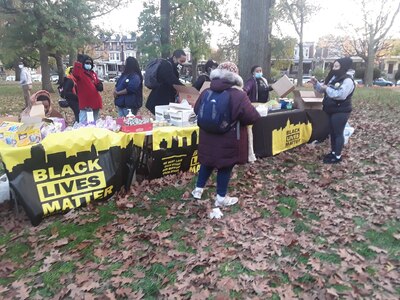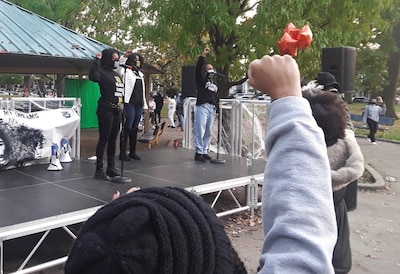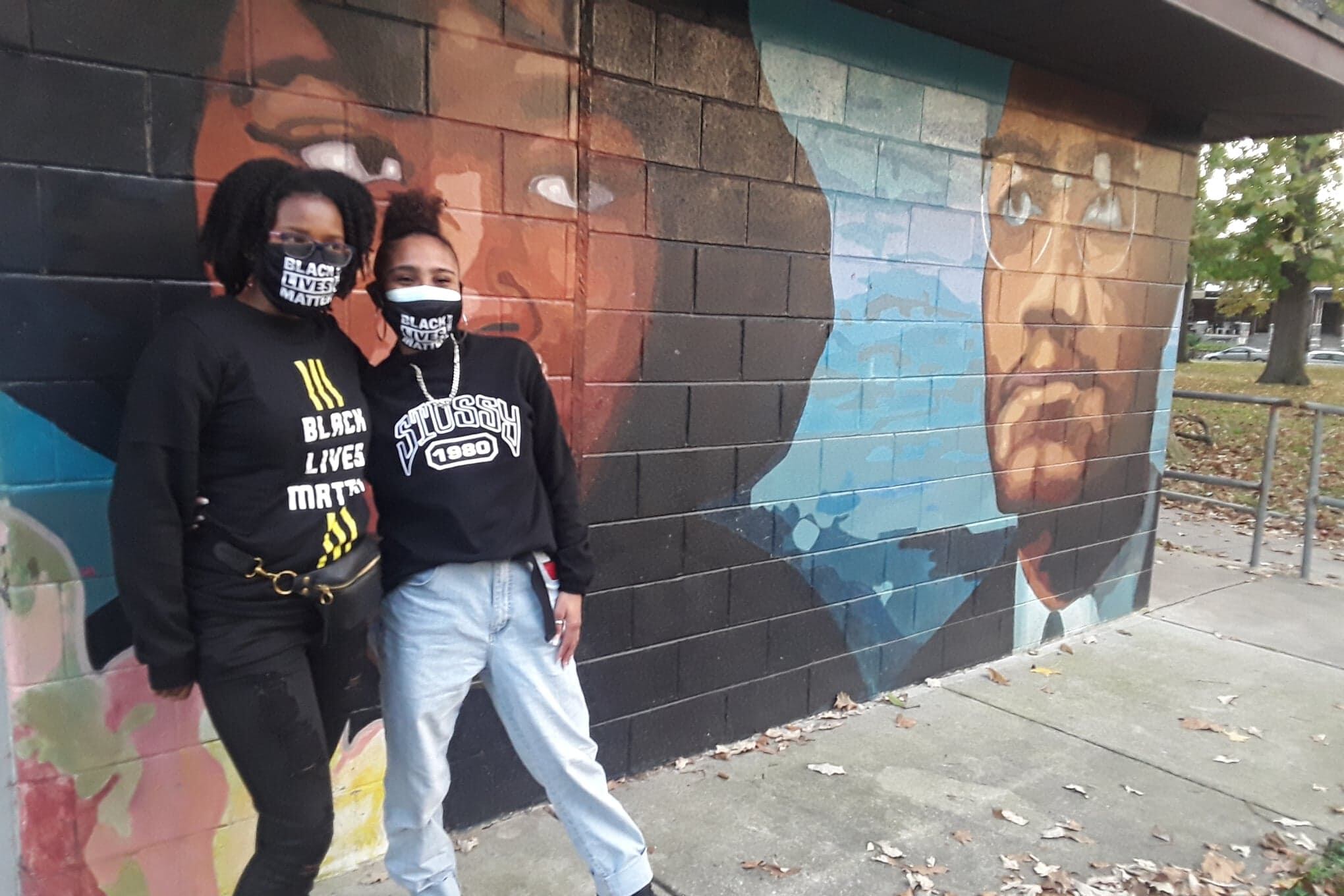Giovanni Pagan, 17, has been watching his grandmother work the polls his entire life.
This year, during one of the most fraught elections in the nation’s history, in one of the most contentious battleground states, it will be his turn.
The junior at the Workshop School said he’s always wanted to be a poll worker. Now that his grandmother is more vulnerable to the coronavirus, he’s happy to take her place.
Pagan is only one of many Philadelphia students, themselves too young to vote, who have volunteered this year to be poll workers and have engaged in election-related activities including voter registration and candidate forums.
If you listen to the pundits, read the polls, crunch the turnout numbers, and pay attention to the attacks of President Donald Trump against election integrity in the city and state (he said, “bad things happen in Philadelphia”), the outcome of the presidential election could be riding on Pennsylvania. Turnout in Philadelphia will have a major effect on who carries the state and ultimately occupies the White House.
Both presidential candidates and their running mates are spending the last days before the election crisscrossing Pennsylvania. Joe Biden was in Philadelphia on Sunday trying to boost turnout in the heavily Democratic city, specifically among Black voters, while Trump concentrated on other parts of the state.
Sheyla Street, a 17-year-old senior at Central High School has long been focused on convincing everyone she knows to participate in the electoral process.
Street is an organizer with Central’s voter registration committee. She and the other members of the group hold regular virtual meetings and forums for local and statewide candidates. They have registered 100 of the 111 potential voters at Central, students who have reached the age of 18 before Nov. 3.
“What we need to get out the vote is badger people until they answer and encourage them and talk them into doing it,” said Street. “Teens don’t always follow through.”
During a meeting of the committee last week, Street talked about how the prior several days had been “tough and depressing for everyone,” after the police shooting of Walter Wallace, Jr.
“I was starting to lose hope, and think that after all this work, it doesn’t matter,” she said.
Then she went to a voting site in Overbrook. “The line was literally two or three blocks long,” she said. “There was a 92-year-old lady out there. There was a boy who said he was a future voter. They were standing in line for four and five hours.”
The scene “was motivating to me,” she said. “I can’t give up, because all these other people aren’t giving up. The work we’re doing is having an effect, people are turning out.”
And these teens, most not old enough to vote, are determined to do their part. Organizations and initiatives to increase voter turnout and involvement, especially among young people, have been busy throughout the election season.
Central’s voter registration committee works with several citywide organizations for young people including When Philly Votes, the local chapter of When We All Vote. Poet, playwright and novelist Lorene Cary started Vote that Jawn. Philly Youth Vote! is a collaboration of community organizations and educators to get young people involved in the election, and to vote if they are eligible. The School District of Philadelphia has a voter registration page on its website and it held a districtwide virtual voter registration assembly last month.
Tom Quinn, a social studies teacher who helped start Philly Youth Vote!, has worked with Central students on civic activism since 2008.
“This year is different from others, because it’s a presidential election and the political climate is so contentious and divided,” Quinn said. “Police brutality, gun violence, racism and antiracism, and the ongoing disparities in schools and neighborhoods are all impacting students.”
All this “piqued young people’s interest,” he said, and “they really took charge.” The pandemic set back the students’ efforts, “until we learned how to engage young voters remotely and went full steam on social media. But we regained our footing, and no matter the format, young people know and care about the outcome of this election” and the importance of their voice.
On Saturday, Street and several other Central students organized a Black Lives Matter event at Malcolm X Park in West Philadelphia and ran a voter education table. The event had originally been planned as a Halloween celebration, but that changed after Wallace’s death.

“When tragedies happen in our community we have to unite, and have to include the youth because the youth are feeling the same thing, but 10 times worse,” she said. “We’re not in school and we’re not in the community, so it’s important for us to gather and celebrate our joy and also recognize our pain in order to heal.”
Street, who missed the age requirement to vote by two weeks, plans to work the polls Tuesday and host a get out the vote event. “We’re running through the finish line,” Street said. “We’re almost there.”
Keziah Ridgeway, who teaches African American history and International Baccalaureate social and cultural anthropology at Northeast High School, spoke at the BLM event Saturday.
“It’s not enough for me to just teach in the classroom,” she said. “It has to go beyond the classroom.”
Since Ridgeway voted early, she plans to spend Election Day hosting a student town hall at Northeast High School on Zoom to discuss Wallace’s death. The Black Student Association is spearheading the student-only event.
“It is important that we allow them to use their voice,” she said. “We don’t have to give them anything, they actually have all the tools they need. We adults keep getting it wrong, but the youth have the answer.”
“There’s an African proverb that says a child that’s forgotten about a village will burn it down just to feel its warmth,” Ridgeway said. “It’s time that we stop forgetting the youth of this city.”
Tatiana Roldan, a 17-year-old student at Northeast High School, helped Street organize Saturday’s event. She’s currently the president of the school’s Black Student Association.

“The youth are so underrepresented. Having an event like this shows we can all bond together,” she said. “I plan on telling people Tuesday to go and vote.”
Lucy Duckworth, a 17-year-old senior at Masterman High School, also signed up to be a poll worker after learning Philadelphia might have a shortage this year because of the pandemic. Older people, more vulnerable to the coronavirus, were staying home.
At first, she said, it was an “issue I didn’t know existed.” But then she saw an Instagram post from the Poll Hero Project, which advertises poll working positions to teens through social media sites. She signed up that day. Since then, she has signed up hundreds of students, including her classmates.
One is Rory Macdonald, a 17-year-old senior at Masterman. He has also done significant work trying to turn out the vote. MacDonald works with an organization called Vietlead, which helps register Asian Americans and other people of color.
“Every Sunday, I sat on my couch for three hours and called people and helped them through the registration process.” Macdonald said. “It’s apolitical … [we’re] just trying to give people information that they might not have.”
Macdonald said he focuses specifically on people of color because “we have a really terrible history of voter suppression in our country.”
Many of the Central students on the voter registration committee will also work the polls. And, like Macdonald, have spent time trying to convince friends and family to vote. They have discovered that many people remain cynical.
“For a while I had a misconception about voting,” said Eden (DeeDee) McLendon, 16, a junior from Germantown. “I thought it was pointless, these people make decisions for us” and the average person has no control over what they do.
Then she did some research and changed her mind. But she hasn’t necessarily been able to sway some family members.
“They just say, ‘I can’t be bothered,’” she said. “My mom has a billion siblings and some of them didn’t register. It’s confusing to me, they have this power, and voting is a thing that is important.” When she asks why they won’t vote, people tell her they say they don’t like either candidate, or they don’t care, or whoever wins won’t affect them. Now, she feels that “if I can get just one person to vote, that’s a representation of me voting.”
Once, when Street was at a voter registration table outside a grocery story, she chased down a man who had ignored her invitation. The man told her he was an ex-felon who now owns a business, but doesn’t believe the political process — or the choices available — cared about helping people like him.
Still, she didn’t give up, telling him that there were plenty of local candidates on the ballot he could support. “At some point, he broke. He said, “Yeah, I see your point. I really like you guys and I want to vote for you guys.” And he registered.
Zion Sykes, 17, a senior who lives in Roxborough, said he has also faced cynicism or indifference. Some older cousins shrugged off his pleas, saying politicians never do anything they say.
“I see that skepticism…they have no faith in people to make the change they want,” he said.
Sophomore Evelyn Feldman, 15, said she tells people that “there are so many big topics being debated right now. A lot are affecting me now or will in the future. I can’t vote, but a lot of changes will happen in the next four years in big issues, and helping people register to vote is my way of helping to decide my future.”
As with the other students, she said a lot of her family members don’t vote because they don’t think things will ever change.
Sykes said 60% to 70% of his peers regard voting as a “coming of age moment.” Others shrug it off.
“I guess,” he said, “that it’s our job to try to convince them they can make a difference.”
Additional Resources
Philadelphia Student Union
Want to get involved? Become a member.
Philadelphia Black Student Alliance
Education Website
Penn African Students Association (PASA)
Understanding the Hispanic/Latino Vote
Pew Research Center






